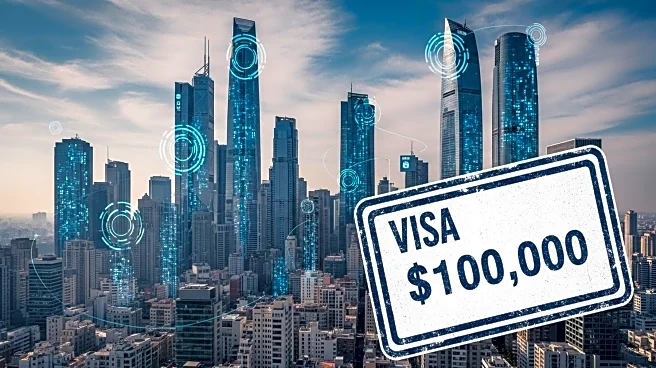What's Happening?
President Trump has signed a proclamation imposing a $100,000 fee on H-1B visa applications, a significant increase from the previous $215 registration fee. The H-1B visa program allows U.S. companies to hire foreign workers in specialized fields such as IT, engineering, and medicine. The program is capped at 65,000 new visas annually, with an additional 20,000 for foreign graduates with advanced degrees from U.S. universities. The administration aims to curb perceived abuses of the program, which it claims displaces American workers. The White House reports that the share of IT workers with H-1B visas has increased from 32% in 2003 to over 65% today, while unemployment among recent computer science graduates has reached 6.1%. The move has sparked concern among Silicon Valley leaders, who argue that the program has been instrumental in creating successful companies.
Why It's Important?
The fee increase is likely to have significant implications for the U.S. tech industry, which relies heavily on H-1B visa holders for skilled labor. Companies may face increased costs and challenges in hiring foreign talent, potentially affecting their competitiveness and innovation. Critics argue that the fee hike could lead to a talent drain, as skilled workers may seek opportunities in countries with more favorable immigration policies. The decision also reflects broader immigration policy shifts under the Trump administration, prioritizing American workers and national security concerns.
What's Next?
The proclamation allows for case-by-case exemptions if deemed in the national interest, suggesting potential flexibility in its implementation. The Labor Secretary is directed to revise wage requirements to prevent undercutting American salaries. Tech companies and industry groups may lobby for changes or seek alternative strategies to mitigate the impact of the fee increase. The broader implications for U.S. immigration policy and its effect on the tech sector will likely continue to be a topic of debate.
Beyond the Headlines
The fee increase may prompt a reevaluation of the H-1B visa program's role in the U.S. economy and its impact on domestic employment. Ethical considerations regarding the balance between protecting American jobs and fostering innovation through global talent may arise. The decision could also influence international perceptions of the U.S. as a destination for skilled workers, potentially affecting its global competitiveness.









